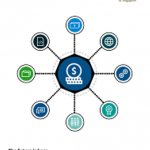As more consumers in Singapore spend more on daily essentials to accommodate the move towards staying at home more for work and play, United Overseas Bank (UOB) has enhanced its UOB One Card rebate programme to bring greater value to consumers.
Through UOB’s collaboration with the Dairy Farm Singapore (DFSG), more than a million UOB One Credit and Debit cardmembers can earn the highest rebates in Singapore when they spend on necessities, such as groceries and other household essential items at any DFSG stores.
UOB One Card members can now earn up to 10 per cent cash rebates for all purchases made at any of DFSG’s physical and online stores such as Cold Storage, Giant, Guardian and 7-Eleven. With more than 600 stores island-wide, DFSG has the widest network of groceries, health and beauty and convenience stores in Singapore.
The enhanced UOB One Card rebate programme will also benefit cardmembers of the UOB One Debit card, who can now earn three per cent rebates on groceries, health and beauty products at DFSG stores. This new benefit can be enjoyed with a minimum spend of $500 per month.
Ms Choo Wan Sim, Head of Payments and Cards Singapore, UOB, said groceries have been one of the fastest-growing spending categories since COVID-19 safe distancing requirements were enforced.
“From January to May of this year, UOB cardmembers spent 55 per cent more on groceries compared with the same period last year. For online groceries, they spent 78 per cent more. While many priorities have changed as a result of COVID-19, providing for our loved ones has not. Among UOB One Cardmembers for example, groceries has been among their top five spending categories since 2017. This year, it moved into the top three. Through our collaboration with DFSG, we want to help our customers stretch their household budget that bit further,” Ms Choo said.
Ms Gwendolyn Cheong, Head of Corporate and Consumer Affairs, South East Asia, DFSG, said, “Since the beginning of COVID-19, we have seen a significant upward trend of customers buying more and at a higher frequency, at both our in-store and online stores. We are also aware that our customers are increasingly looking to maximise savings given that many are still spending more time at home.
“As such, it is timely and important that we continue our partnership with UOB. Through the UOB One Card, customers can earn rebates across all our brands including Cold Storage, Market Place, Jasons, Jasons Deli, Giant, Guardian and 7-Eleven, giving them greater value across a wide network of stores and product range.”
Providing the most generous rebates for daily essentials and everyday spending The enhanced rebate rate for purchases made at DFSG stores adds to the UOB One Credit Card’s existing privileges, including rebates for other everyday expenses, such as paying for Grab rides and food delivery and home utility bills.
For example, a UOB One Card member who spends an average of $2,000 each month on their UOB One Credit card will be able to earn five per cent cash rebate on all spend. They will earn an additional five per cent cash rebate on spend made at DFSG stores and for Grab rides and food delivery paid through the One Credit Card. If the cardmember uses the UOB One Credit Card to pay for their Singapore Power (SP) home utility bills, they will also enjoy an additional one per cent cash rebate.
Customers who prefer to spend on their UOB One Debit card can also earn three per cent cash rebate when they charge their card at any DFSG store, capped at $20 a month. UOB One Debit cardmembers simply need to ensure that they meet the required minimum monthly spend of $500 to enjoy the cash rebate.
In May 2020, the Monetary Authority of Singapore (MAS) implemented the Credit Limit Management Measure to help borrowers avoid accumulating excessive unsecured debts. From 1st June 2019, an individual’s unsecured credit limit will be reduced from 18 to 12 times of his/ her monthly income. In other words, if your unsecured credit balance is more than 12 times of your monthly income, you will face restrictions when utilising unsecured credit.
With these MAS credit limit management restrictions, you will not be able to: –
1) charge new purchases to your credit card;
2) issue cheques or draw money from your unsecured credit line;
3) pay recurring charges with your credit card, and
4) apply for new credit cards, unsecured loans, or increase your credit limit.
As a result of the new limit, some of you may be affected and may soon see your credit utilisation disrupted. There are hence concrete steps that you can take to reduce your unsecured debts which are discussed below.
Firstly, knowing is half the battle won. In Credit Bureau Singapore’s (CBS) credit report, you will find the necessary data to help you come up with a comprehensive plan to reduce your outstanding balances. Your credit report is a record of your credit payment history complied from banks and major financial institutions and it should be the first place you go to better understand the totality of your debts.
Secondly, you have to plan your expenditure wisely so that you can focus more on paying off debts.
Thirdly, you have to make payments to your credit facilities in full and on time. If you are unable to do so, you should try to maximise your payments and remedy any delinquencies or defaults.
Next, you can seek credit counselling from Credit Counselling Singapore, where they specialise in helping individuals to address their unsecured, legal, and consumer debt problems through education, credit counselling and facilitated debt restructuring.
Lastly, you may consider signing up for the Debt Consolidation Plan (DCP). DCP is a little known option of reducing credit debt. It is a debt refinancing program where a customer consolidates all his unsecured credit facilities across various financial institutions under 1 participating financial institution.






